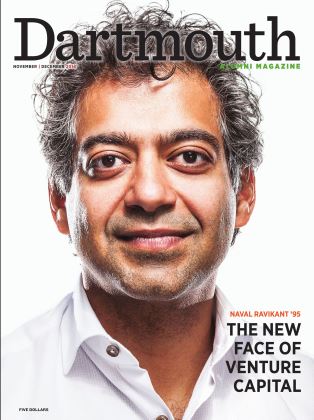“WE SHOULD BE CAREFUL ABOUT WHAT WE make,” Carr warns in his latest book. Rather than cede our interaction with the world around us to technology, he argues, we should reclaim it as a tool of discovery, as the scientist uses the microscope or the explorer uses the spaceship. “Whenever an instrument allows us to cultivate a new talent,” he writes, “the world becomes a different and more intriguing place, a setting of even greater opportunity.”
Carr has been making the case for more thoughtful adaptation of computers for more than a decade, since the widely debated article he wrote in 2003 as executive editor of the Harvard Business Review, “IT Doesn’t Matter.” He continued to question society’s growing dependence on machines in a celebrated 2008 Atlantic Monthly cover story, “Is Google Making Us Stupid?” and expanded his argument into the intellectual and cultural consequences with The Shallows: What the Internet Is Doing to Our Brains, a finalist for the 2011 Pulitzer Prize in general nonfiction. In his new book, Carr takes an even closer look at how computers—our “familiar, obliging helpmates”— change what we do and who we are.
Part intellectual history, part popular science and part cultural criti- cism, The Glass Cage considers humankind’s entanglement with machines, from 19th-century textile mills to the augmented reality of Google Glass. Carr says it’s hard not to feel awestruck—and apprehensive. “Automation, for all its benefits, can take a toll on the performance and talents of those who rely on it,” he says. “The choices we make, or fail to make, about which tasks we hand off to machines shape our lives and the place we make for ourselves in the world.” He recommends becoming a more discerning and demanding user. “It’s about seeking out tools that expand our possibilities for thought and action rather than settling for ones that turn us into bystand- ers,” Carr tells DAM. He promises the shift from technology-centered design to human-centered design will enable us to use technology to expand life’s possibilities rather than narrow them: “Living your life through a screen may be easy, but it’s not very satisfying.”
The Glass Cage: Automation and Us W.W. NORTON & CO. 288 PP. $20
 View Full Issue
View Full Issue
More From This Issue
-
 Feature
FeatureGame Changer
November | December 2014 By Jennifer Wulff ’96 -
 COVER STORY
COVER STORYAvenging Angel
November | December 2014 By ERIC SMILLIE ’02 -
 Feature
FeatureSeuss On the Loose
November | December 2014 By RICK BEYER ’78 -
 Feature
FeatureClassnotes
November | December 2014 By DARTMOUTH COLLEGE LIBRARY -
 Feature
FeatureNotebook
November | December 2014 By REBECCA BURTEN ’16/THE DARTMOUTH -
 Sports
SportsA Record That Wasn’t
November | December 2014 By PETE WEBSTER ’71









